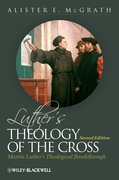
Luther's theology of the cross: Martin Luther's theological breakthrough
McGrath, Alister E.
Luther's Theology of the Cross represents a fully revised and updated editionof the classic 1985 text that expands on the author's ongoing research and reflects 25 years of Luther scholarship. Rewritten and expanded edition of a highly-acclaimed classic text Incorporates primary and secondary sources that have become available since the publication of the first edition Draws on advances in our understanding of the late medieval intellectual, cultural, and religious background of Luther's early development, and the nature of Luther's doctrine of justification (including the so-called 'Finnish' school), many of which have not yet been incorporated into Luther scholarship Luther's theological breakthrough' continues to be of central importance to Reformation Studies andthe development of Protestantism Written by one of the world's leading Protestant theologians, who is an authority on the development of the doctrine of justification. His classic work Iustitia Dei: A History of the Christian Doctrine of Justification is now in its third edition (2005) INDICE: Part One: The Background: Luther as a Late Medieval Theologian 150914. 1 The Dawn of the Reformation at Wittenberg. The late medieval context. The concept of justification in Christian thought. The reform of the church andthe renewal of spirituality. The Ninety-Five Theses. The importance of the present study. 2 Headwaters of the Reformation at Wittenberg: Humanism, Nominalism, and the Augustinian Tradition. The via moderna and via antiqua at Wittenberg. A new school of thought? The via Gregorii at Wittenberg. Luther and the Augustinian Order. Humanism: The Studia Humanitatis at Wittenberg. Nominalism: The Via Moderna at Wittenberg. The Augustinian Tradition: A Modern Augustinian School at Wittenberg? 3 Luther as a Late Medieval Theologian. The Dictata super Psalterium. Luthers biblical hermeneutic, 151314. The debate over the date of Luthers theological breakthrough. Part Two: The Breakthrough: Luther in Transition 151419. 4 Mira et nova diffinitio iustitiae: Luthers Discovery of the Righteousness of God. Luthers Difficulties in the Light of Late Medieval Theology. The Theological Pactum and Existential Anxiety. The Righteousness of God and The Righteousness of Faith. Luthers Exposition of Psalms 70 (71) and 71 (72). Luthers Break with the Soteriology of the Via Moderna (1515). The Nature and Significance of Luthers Critique of Aristotle. The Nature and Date of Luthers Theological Breakthrough. 5 Crux sola est nostra theologia: The Emergence ofthe Theology of the Cross 151419. The Heidelberg Disputation (1518) and the Theology of the Cross. The Leading Themes of Luthers Theology of the Cross. TheRighteousness of God and the Theology of the Cross. The Theology of the Crossas a Critique of Analogical Language about God. The Crucified and Hidden God.Faith, Doubt and Anfechtung. Luthers theological development, 150919: A Summary. Select Bibliography. Index.
- ISBN: 978-0-470-65530-6
- Editorial: John Wiley & Sons
- Encuadernacion: Cartoné
- Páginas: 264
- Fecha Publicación: 15/04/2011
- Nº Volúmenes: 1
- Idioma: Inglés
